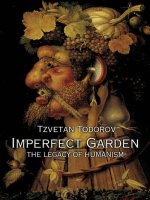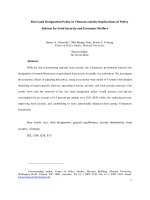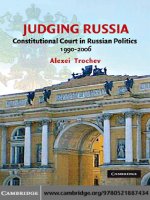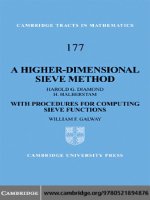0521813042 cambridge university press liberal pluralism the implications of value pluralism for political theory and practice may 2002
Bạn đang xem bản rút gọn của tài liệu. Xem và tải ngay bản đầy đủ của tài liệu tại đây (1.28 MB, 151 trang )
This page intentionally left blank
liberal pluralism
William A. Galston is a distinguished political philosopher whose work is informed by his experience of having also served in public office: From 1993 to
1995 he was President Clinton’s Deputy Assistant for Domestic Policy. Professor
Galston is thus able to speak with an authority rare among political theorists
about the implications of advancing certain moral and political values in practice.
The foundational argument of this book is that liberalism is compatible with
the value pluralism first espoused by Isaiah Berlin. Professor Galston defends a
version of value pluralism and argues, against the contentions of John Gray and
others, that it undergirds a kind of liberal politics that gives weight to the ability
of individuals and groups to live their lives in accordance with their deepest beliefs
about what gives meaning and purpose to life.
Professor Galston argues against what he calls “monistic” theories of value
that either reduce all goods to a common measure or create a comprehensive hierarchy among goods. He operates from very different assumptions: that value
pluralism does not degenerate into relativism, that objective goods cannot be
fully rank-ordered, that some goods are basic in the sense that they are key to any
choiceworthy conception of life, and that there is a wide range of legitimate diversity of individual conceptions of good lives and of public cultures and purposes.
From these premises William Galston explores how his liberal pluralism has important implications for political deliberation and decision making, for the design
of public institutions, and for the division of legitimate authority among government, religious institutions, civil society, parents and families, and individuals.
Few contemporary writers on political theory have William Galston’s status as
both a significant political philosopher and political actor. This feature, combined
with the nontechnical language in which the arguments are developed, should
ensure that this provocative book is eagerly sought out by professionals in philosophy, political science, law, and policy making, as well as by general readers
interested in these areas.
LIBERAL PLURALISM
The Implications of Value Pluralism
for Political Theory and Practice
WIL LIAM A . GA LSTO N
University of Maryland
The Pitt Building, Trumpington Street, Cambridge, United Kingdom
The Edinburgh Building, Cambridge CB2 2RU, UK
40 West 20th Street, New York, NY 10011-4211, USA
477 Williamstown Road, Port Melbourne, VIC 3207, Australia
Ruiz de Alarcón 13, 28014 Madrid, Spain
Dock House, The Waterfront, Cape Town 8001, South Africa
© William A. Galston 2004
First published in printed format 2002
ISBN 0-511-03012-6 eBook (Adobe Reader)
ISBN 0-521-81304-2 hardback
ISBN 0-521-01249-X paperback
To the victims and heroes of September 11
Adversity doth best discover virtue.
Francis Bacon
contents
Acknowledgments
I
1
page ix
INTRODUCTION
Pluralism in Ethics and Politics
3
II FROM VALUE PLURALISM TO LIBERAL
PLURALIST THEORY
2
Two Concepts of Liberalism
15
3
Three Sources of Liberal Pluralism
28
4
Liberal Pluralist Theory: Comprehensive, Not Political
39
5
From Valu
e Pluralism to Liberal Pluralist Politics
48
6
Valu
e Pluralism and Political Community
65
III
THE PRACTICE OF LIBERAL PLURALISM
7
Democracy and Valu
e Pluralism
81
8
Parents, Government, and Children: Authority over
Education in the Liberal Pluralist State
93
9
10
Freedom of Association and Expressive Liberty
110
Liberal Pluralism and Civic Good
s
124
Index
133
vii
acknowledgments
I am grateful to my colleagues at the University of Maryland’s Institute
for Philosophy and Public Policy for many years of stimulating discussions on the topics addressed in this book. I have persuaded none of
them but have learned from all of them.
I have enjoyed the opportunity to present parts of my arguments at
meetings organized by the IIT Chicago-Kent College of Law, the College
of William and Mary School of Law, the University of Maryland School
of Law, the Philosophy Department of George Washington University,
the Political Science Department of the University of Chicago, the Social Philosophy and Policy Center of Bowling Green State University, the
American Society for Political and Legal Philosophy, and the Institute for
Political Studies of the Portuguese Catholic University. The dialogue on
those occasions contributed significantly to the development of this book.
Earlier versions of portions of this book have appeared in the American
Political Science Review, the William and Mary Law Review, and Ethics,
and in Democracy, edited by Ellen Frankel Paul, Fred D. Miller, Jr., and
Jeffrey Paul (Cambridge University Press, 2000). I am grateful for the
necessary permissions to make use of these materials in revised form.
I also wish to acknowledge the recent publication of two important
works that deal with some of the topics I take up in this book: Andrew
Mason’s Community, Solidarity, and Belonging: Levels of Community
and Their Normative Significance (Cambridge University Press, 2000)
and Jeff Spinner-Halev’s Surviving Diversity: Religion and Democratic
Citizenship (Johns Hopkins University Press, 2000). I regret that these
books came to my attention too late to allow me at this time to address
the significant arguments they present. I hereby offer these authors (and
others I may have neglected) a promissory note for the future.
ix
liberal pluralism
PA R T I
introduction
1
pluralism in ethics
and politics
This book brings together and develops themes that have occupied me
over the past decade of scholarly and public life. It defends a liberal
theory of politics that is pluralist rather than monist and (in John Rawls’s
sense) comprehensive rather than freestanding or “political.”
l ibe ral is m
Let me begin by stating what I believe it means to be a liberal, in the
theoretical, not political, sense of the term.
Liberalism requires a robust though rebuttable presumption in favor
of individuals and groups leading their lives as they see fit, within a broad
range of legitimate variation, in accordance with their own understanding of what gives life meaning and value. I call this presumption the
principle of expressive liberty. This principle implies a corresponding
presumption (also rebuttable) against external interference with individual and group endeavors.
To create a secure space within which individuals and groups may
lead their lives, public institutions are needed. Liberal public institutions
may restrict the activities of individuals and groups for four kinds of reasons: first, to reduce coordination problems and conflict among diverse
legitimate activities and to adjudicate such conflict when it cannot be
avoided; second, to prevent and when necessary punish transgressions
individuals may commit against one another; third, to guard the boundary separating legitimate from illegitimate variations among ways of life;
and finally, to secure the conditions – including cultural and civic conditions – needed to sustain public institutions over time. Specifying the
3
IN TRO DUCTIO N
content of these conditions requires a mode of inquiry that is empirical
as well as theoretical.
Two consequences follow from this account of public institutions.
First, for public purposes, the value of these institutions, and of the
public activities they shape, is understood as instrumental rather than
intrinsic. For some individuals, to be sure, public life will be an element
(perhaps even the dominant element) of what they define as the intrinsic
meaning and value of their own lives, but this conception is not part of
an understanding of liberal politics that is binding on all members of
the political community. An instrumental rather than intrinsic account
of the worth of politics forms a key distinction between liberalism and
civic republicanism.
Second, liberal public institutions are understood as limited rather
than plenipotentiary. There are multiple, independent, sometimes competing sources of authority over our lives, and political authority is not
dominant for all purposes under all circumstances. Liberalism accepts
the importance of political institutions but refuses to regard them as
architectonic. (I call this understanding of the limits of politics the principle of political pluralism.)
If this is roughly what liberalism means, why be a liberal? One answer draws from experience and common sense: Broadly liberal public regimes tend over time to satisfy more of the legitimate needs of
their publics and to generate more unforced, sustained loyalty than do
other forms of political association. A second answer (offered by John
Rawls in Political Liberalism)1 suggests that liberalism draws from, and
comports with, a widely shared stock of freestanding moral premises
concerning relations among human beings and the nature of political
association.
p l ural is m an d m on is m
While each of these answers has merit, neither is sufficient. I suggest
that liberalism derives much of its power from its consistency with
the account of the moral world offered by Isaiah Berlin and known as
value pluralism. The concluding section of Berlin’s “Two Concepts of
1 John Rawls, Political Liberalism; with a New Introduction and the “Reply to Habermas”
(New York: Columbia University Press, 1996).
4
PLUR ALISM IN E TH ICS AN D PO L ITICS
Liberty”2 has helped spark what may now be regarded as a full-fledged
value-pluralist movement in contemporary moral philosophy. Leading contributors to this movement include Bernard Williams, Stuart
Hampshire, Joseph Raz, Steven Lukes, Michael Stocker, Thomas Nagel,
Charles Taylor, Martha Nussbaum, Charles Larmore, John Gray, and
John Kekes.3 During the past decade, moral philosophers have clarified and debated many of the complex technical issues raised by value
pluralism, as well as broader objections to the overall approach.4
Throughout this book I explore many of these issues and defend value
pluralism at some length. For the purposes of this introduction, a few
basics will suffice.
1. Value pluralism is not relativism. The distinction between good and
bad, and between good and evil, is objective and rationally defensible.
2. Objective goods cannot be fully rank-ordered. This means that
there is no common measure for all goods, which are qualitatively
heterogeneous. It means that there is no summum bonum that is the
chief good for all individuals. It means that there are no comprehensive lexical orderings among types of goods. It also means that there
is no “first virtue of social institutions”5 but, rather, a range of public goods and virtues the relative importance of which will depend on
circumstances.
2 In Isaiah Berlin, Four Essays on Liberty (Oxford: Oxford University Press, 1969).
3 See Bernard Williams, “Conflicts of Values,” in Moral Luck (Cambridge: Cambridge
University Press, 1981); Stuart Hampshire, “Morality and Conflict,” in Morality and
Conflict (Cambridge, Mass.: Harvard University Press, 1983); Joseph Raz, The Morality
of Freedom (Oxford: Clarendon Press, 1986); Steven Lukes, “Making Sense of Moral Conflict,” in Moral Conflict and Politics (Oxford: Clarendon Press, 1991); Michael Stocker,
Plural and Conflicting Values (Oxford: Clarendon Press, 1990); Thomas Nagel, “The
Fragmentation of Value,” in Mortal Questions (Cambridge: Cambridge University Press,
1979); Charles Taylor, “The Diversity of Goods,” in Amartya Sen and Bernard Williams,
eds., Utilitarianism and Beyond (Cambridge: Cambridge University Press, 1982); Martha
Nussbaum, The Fragility of Goodness: Luck and Ethics in Greek Tragedy and Philosophy (Cambridge: Cambridge University Press, 1986); Charles Larmore, Patterns of Moral
Complexity (Cambridge: Cambridge University Press, 1987); John Gray, Isaiah Berlin
(Princeton, N.J.: Princeton University Press, 1996); John Kekes, The Morality of Pluralism (Princeton, N.J.: Princeton University Press, 1993).
4 See Ruth Chang, ed., Incommensurability, Incomparability, and Practical Reason
(Cambridge, Mass.: Harvard University Press, 1997); also Glen Newey, “Metaphysics Postponed: Liberalism, Pluralism, and Neutrality,” Political Studies 45 (1997):
296–311, and “Value Pluralism in Contemporary Liberalism,” Dialogue 37 (1998):
493–522.
5 Which John Rawls asserts justice to be in A Theory of Justice (Cambridge, Mass.: Harvard
University Press, 1971).
5
IN TRO DUCTIO N
3. Some goods are basic in the sense that they form part of any
choiceworthy conception of a human life. To be deprived of such goods
is to be forced to endure the great evils of existence. All decent regimes
endeavor to minimize the frequency and scope of such deprivations.
4. Beyond this parsimonious list of basic goods, there is a wide range
of legitimate diversity – of individual conceptions of good lives, and
also of public cultures and public purposes. This range of legitimate
diversity defines the zone of individual liberty, and also of deliberation
and democratic decision making. Where necessity (natural or moral)
ends, choice begins.
5. Value pluralism is distinguished from various forms of what I will
call “monism.” A theory of value is monistic, I will say, if it either (a)
reduces goods to a common measure or (b) creates a comprehensive
hierarchy or ordering among goods.
Just as one must ask why it makes sense to be a liberal, one must ask
why value pluralism is to be preferred to the various forms of monism
that thinkers have advanced since the beginning of philosophy as we
know it. In the course of this book I shall try to develop a systematic
answer, but a few preliminary remarks may be helpful.
To begin, monistic accounts of value lead to procrustean distortions
of moral argument. The vicissitudes of hedonism and utilitarianism in
this respect are well known. Even Kant could not maintain the position
that the good will is the only good with moral weight; whence his account of the “highest good,” understood as a heterogeneous composite
of inner worthiness and external good fortune.
Second, our moral experience suggests that the tension among broad
structures or theories of value – consequentialism, deontology, and virtue
theory; general and particular obligations; regard for others and justified
self-regard – is rooted in a genuine heterogeneity (or as Thomas Nagel
puts it, “fragmentation”) of value. If so, no amount of philosophical
argument or cultural progress can lead to the definitive victory of one
account of value over the rest. Moral reflection is the effort to bring
different dimensions of value to bear on specific occasions of judgment
and to determine how they are best balanced or ordered, given the facts
of the case.
Similar difficulties arise when we are confronted with a plurality of
specific interests or goods, rather than of moral structures. For some
6
PLUR ALISM IN E TH ICS AN D PO L ITICS
years I served as a White House official responsible for managing a
portion of domestic policy on behalf of the president. Over and over
again I had the same experience: I would be chairing an interagency
task force designed to reach a unified administration position on some
legislative or regulatory proposal. As the representatives of the departments argued for their various views, I found it impossible to dismiss
any one of them as irrelevant to the decision, or as wholly lacking in
weight. Nor could I reduce the competing considerations to a common
measure of value; so far as I or anyone else could tell, they were irreducibly heterogeneous. The issues were qualitative, not quantitative: In
the particular circumstances, which considerations should be regarded
as more important, or more urgent? If a balance was to be struck, what
weighting of competing goods could reasonably be regarded as fair?
I found it remarkable how often we could reach deliberative closure
in the face of this heterogeneity. Many practitioners (and not a few
philosophers) shy away from value pluralism out of fear that it leads
to deliberative anarchy. Experience suggests that this is not necessarily
so. There can be right answers, widely recognized as such, even in the
absence of general rules for ordering or aggregating diverse goods.
It is true, as John Rawls pointed out more than thirty years ago, that
pluralism on the level of values does not rule out, in principle, the existence of general rules for attaching weights to particular values or of
establishing at least a partial ordering among them.6 But in practice,
these rules prove vulnerable to counterexamples or extreme situations.
As Brian Barry observes, Rawls’s own effort to establish lexical priorities among heterogeneous goods does not succeed: “[S]uch a degree of
simplicity is not to be obtained. We shall . . . have to accept the unavoidability of balancing, and we shall also have to accept a greater variety of
principles than Rawls made room for.”7 But, to repeat, the moral particularism I am urging is compatible with the existence of right answers in
specific cases; there may be compelling reasons to conclude that certain
trade-offs among competing goods are preferable to others.
6 See John Rawls, A Theory of Justice, p. 42.
7 Brian Barry, Political Argument; A Reissue with a New Introduction (Berkeley: University
of California Press, 1990), p. lxxi. Barry goes on to suggest that something like the Original
Position, understood as embodying the requirement that valid principles must be capable
of receiving the free assent of all those affected by them, might nonetheless lead to general
principles for balancing competing values.
7
IN TRO DUCTIO N
c o m p r e h e n s ive an d f re e s t an din g
p ol it ical t he orie s
Some philosophers argue that it is theoretically improper and practically imprudent to link political principles to other parts of philosophy,
even ethics or value theory. Political theory should be freestanding, not
“comprehensive.” For reasons that I discuss at length in Chapter 4,
I disagree: Political theory cannot be walled off from our general understanding of what is good and valuable for human beings, or from our
understanding of how human existence is linked to other beings and to
existence simpliciter. I am not advocating “foundationalism”; indeed,
it is not clear that this architectural metaphor really clarifies anything.
The point is not foundations but, rather, connections. Theories in any
given domain of inquiry typically point to propositions whose validity
is explored in other domains. Thought crosses boundaries.8
f o u r t y pe s of p ol it ical t he ory
On the basis of the twin distinctions between pluralism and monism
and between comprehensive and freestanding conceptions, I suggest that
there are four main types of political theory:
1. freestanding/monist. John Rawls’s Political Liberalism is an example; it seeks to decouple political theory from other domains of
inquiry while preserving the various lexical orderings defended in
A Theory of Justice.
2. comprehensive/monist. Classical utilitarianism is an example of this
kind of theory. So, intriguingly, is Ronald Dworkin’s latest
contribution.9
3. freestanding/pluralist. Michael Walzer’s Spheres of Justice is an example of this category. While Walzer offers a wide range of legitimate plural values both among and within public cultures and
refuses to give any public value pride of place for all purposes, he
proceeds empirically/historically and refrains from proposing any
broader theory of good, value, or existence.
8 See my Liberal Purposes (Cambridge: Cambridge University Press, 1991), Chapter 2.
9 See his Sovereign Virtue: The Theory and Practice of Equality (Cambridge, Mass.: Harvard
University Press, 2000), pp. 4–5. For a fuller account, see my review in The Review of
Politics 63, 3 (Summer 2001): 607–611.
8
PLUR ALISM IN E TH ICS AN D PO L ITICS
4. comprehensive/pluralist. On some interpretations, Joseph Raz’s
Morality of Freedom is an example of this genre. In recent writings, John Gray uses comprehensive pluralism to argue for a vision
of politics in which institutional and deliberative legitimacy reflects
a wide range of local conditions.
In this book, I present and defend what I call “liberal pluralism”
as the preferred conception of comprehensive/pluralist theory. In the
process, I argue against taking autonomy to be a defining liberal value,
as Raz appears to do, and also against Gray’s effort to drive a wedge
between pluralism and liberalism.
t h e c o n s e qu e n ce s of p l u ral is m
The consequences of pluralism include not only a distinctive type of political theory but also distinctive conceptions of (inter alia) public culture, public philosophy, constitutionalism, deliberation, public policy,
democracy, and free association. For example, from a liberal pluralist
point of view, I argue, there are multiple types of legitimate decision
making, and democracy is not trumps for all purposes. Another example: From a liberal pluralist point of view, public institutions must be
cautious and restrained in their dealings with voluntary associations,
and there is no presumption that a state may intervene in such associations just because they conduct their internal affairs in ways that diverge
from general public principles.
The relationship between voluntary associations and publicly enforced civic norms has emerged as a key point of disagreement among
contemporary liberals. Some argue that civic goods are important, or
fragile, enough to warrant substantial state interference with civil associations. It is a mistake, they believe, to give anything like systematic
deference to associational claims.10 I disagree. I begin with the intuition
that free association yields important human goods and that the state
bears a burden of proof whenever it seeks to intervene. My accounts
10 Two important recent examples of this genre are Stephen Macedo, Diversity and Distrust: Civic Education in a Multicultural Democracy (Cambridge, Mass.: Harvard
University Press, 2000), and Brian Barry, Culture and Equality (Cambridge, Mass.:
Harvard University Press, 2001). For remarks on Macedo, see my review in Ethics
112, 2 (January 2002): 386–391. For Barry, see my review in The Public Interest 144
(Summer 2001): 100–108.
9
IN TRO DUCTIO N
of value pluralism, expressive liberty, and political pluralism lend theoretical support to this intuition and help explain why we should not see
state power as plenipotentiary.
p l u r a l is m an d civic u n it y
While focused on individual and associational liberty, the account of
politics I offer in this book is certainly not anarchist, libertarian, or
even “classical-liberal.” I make a place for citizenship and civic virtue
and for education directed toward their cultivation. Some readers may
believe that on its face, this civic dimension of my argument is at odds
with my pluralist professions.
I think not. Pluralism does not abolish civic unity. Rather, it leads to
a distinctive understanding of the relation between the requirements of
unity and the claims of diversity in liberal politics. Liberty cannot be
exercised or sustained without a public system of liberty. Politics may
be instrumentally rather than intrinsically good, and partial rather than
plenipotentiary, but it is nonetheless essential. There is no invisible civic
hand that sustains a system of liberty; such a system must be consciously
reproduced. There are limits that education conducted or required by
a liberal pluralist state must not breach. But within those bounds it is
legitimate and necessary and must be robust.
t h e p l an of t his book
The argument of this book proceeds as follows:
Beginning with a puzzle about the relation between civic unity and
associational plurality, Chapter 2 distinguishes between two approaches
to liberalism – one based on the core value of individual rational autonomy, the other on respect for legitimate difference – and argues for the
diversity-based approach as offering a better chance for individuals and
groups to live their lives in accordance with their distinctive conceptions
of what gives meaning and value to life. Chapter 3 begins the task of
defending this preference by offering three sources of legitimate diversity: expressive liberty understood as the fit between outward existence
and inner conceptions of value; Berlinian value pluralism; and political
pluralism understood, along the lines of early-twentieth-century British
thinkers such as Figgis, as the denial of the plenipotentiary power of
10
PLUR ALISM IN E TH ICS AN D PO L ITICS
state institutions over all aspects of social life. Chapter 4 defends the
propriety of linking political theory to other branches of philosophy
(especially moral theory) by questioning the cogency of Rawls’s rejection of “comprehensive” theorizing. Chapter 5 argues, against John
Gray and others, that Berlin was right to see deep compatibility – relations of mutual support – between value pluralism and liberal politics. Exploring an analogy with jurisprudence, Chapter 6 offers an
account of presumptions as a way of moving from open-ended value
pluralism to the kinds of partial agreements that organized political life
requires.
Chapter 7 argues that if we take value pluralism seriously, we are
driven to understand democracy as only one among several legitimate
sources of political authority and modes of decision making. Chapter 8
suggests that if we follow through the implications of the three sources
of legitimate diversity discussed in Chapter 3, we must conclude that
the authority of state institutions over the education of children, while
robust, is nonetheless limited by parental claims that are morally fundamental, rather than derivative from contingent public decisions. Chapter 9 brings many of these considerations together into an account of
the public framework and constitutional principles of the liberal pluralist state. Chapter 10 concludes the argument with reflections on the
relation between value pluralism and key civic goals of justice and unity.
11









